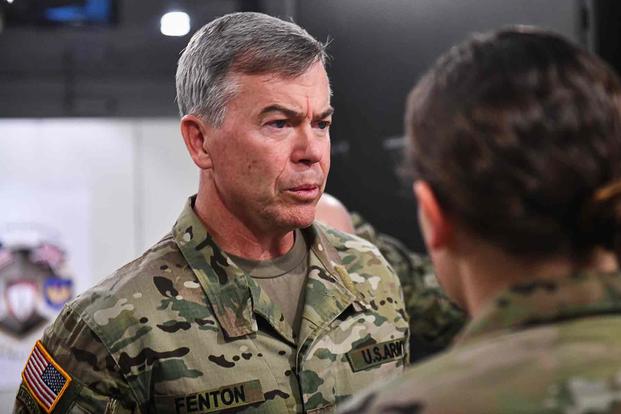The top general in charge of U.S. special operations forces vowed Tuesday to focus on "eradicating" misconduct from his command.
At a Senate Armed Services Committee hearing Tuesday, Sen. Ted Budd, R-N.C., asked Gen. Bryan Fenton, head of Special Operations Command, to comment on a "series of concerning incidents" among the special operations community at Fort Bragg in the senator's home state, including "suicides, murders, overdoses, drug trafficking."
In response, Fenton said that misconduct is "not behavior that is welcome" in Special Operations Command, or SOCOM.
Read Next: Top Ohio Guard General Keeps Job After Shoving Reporter
"This type of behavior, atypical to the 70,000-plus that are doing the right thing each and every day -- a majority are absolutely doing that -- first and foremost disrespects that type of work that our SOCOM enterprise is known for," Fenton said. "And the command sergeant major and I, first of all, are very angry when we get reports like that, and we're deliberately, laser-like focused on this. In fact, we talk about it as a corrosive. These are corrosives toward the trust and confidence that this committee, the secretary and certainly the nation has in us. And we're laser-focused on eradicating that from SOCOM enterprise."
Fenton's comments come after U.S. Army Special Operations Command revealed in January that at least 13 soldiers at Fort Bragg are under investigation for drug trafficking, though no arrests have been made.
Also in January, a pair of shootings, including one that killed a soldier assigned to Fort Bragg, also rocked the special operations community there.
Meanwhile, statistics the Pentagon disclosed to Congress last month showed that 31 soldiers at the base died of drug overdoses between 2017 and 2021, accounting for more than 10% of the total number of overdose deaths reported by the military.
An officer at the base also told local media in 2021 that the installation had seen an "over 100 percent increase" in drug-related crime over the course of that year.
The recent woes at Fort Bragg come after an internal review conducted by SOCOM in 2019 found that a culture of extreme focus on mission accomplishment among special operators often allowed misconduct and unethical behavior to go unchecked.
At Tuesday's hearing, Senate Armed Services Committee Chairman Jack Reed, D-R.I., said the recent trouble makes "additional efforts to build upon" the 2019 review "seem necessary."
"A number of high-profile misconduct cases have reflected poorly on the special operations community," Reed said in his opening statement.
Responding to Budd later in the hearing, Fenton said he's working on stamping out misconduct by emphasizing the need for leadership in preventing drug use and other "untoward, illegal, not ethical and not moral behavior," reinforcing existing policies and standards against such behavior, and holding people accountable for any wrongdoing.
Accountability "sends a very big signal back to the enterprise about, this behavior is absolutely not welcome and not part of the SOCOM enterprise," he said.
"You've got my commitment on this," added Fenton, who previously led SOCOM's Joint Special Operations Command before assuming his current role in August. "I've been in about six months. It's been a top priority because of what it does not only to the trust that this committee and others have in the SOCOM team, but to our overall readiness."
-- Rebecca Kheel can be reached at rebecca.kheel@military.com. Follow her on Twitter @reporterkheel.
Related: More Than a Dozen Special Operations Soldiers at Center of Drug Trafficking Probe














